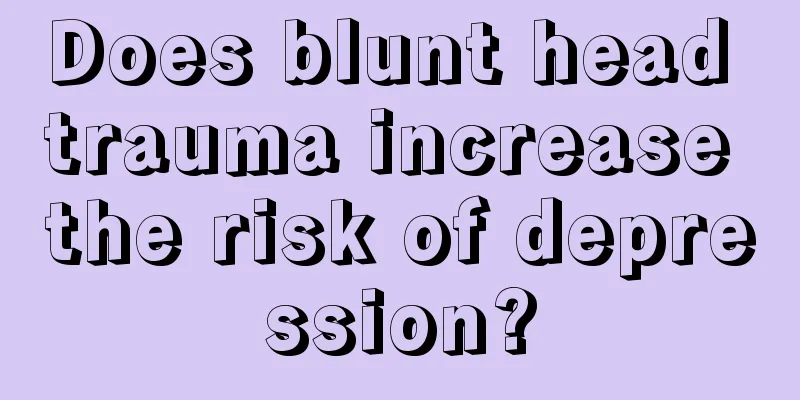Does blunt head trauma increase the risk of depression?

|
I believe everyone is familiar with depression. Due to various social pressures, more and more people are suffering from depression. Depression is very harmful to us. Mild depression will only make you feel bad. Severe depression can be life-threatening. So does blunt head trauma increase the risk of depression? Stay home today and find out After blunt head trauma, the risk of developing depression often increases, can persist for decades, and increases with the severity of the head trauma. Dr. Plassman and his colleagues at Duke University in Durham, North Carolina, collected data from 1,718 people, with an average age of 20.9, who were treated for blunt head trauma while serving in the military between 1944 and 1945. In 1996 and 1997, the researchers retrospectively studied 520 of these individuals and 1,198 veterans who were being treated for other reasons during the same period. It has been reported that veterans with head trauma are more likely to suffer from severe depression, and most veterans with head trauma have more depressive symptoms than veterans without head trauma. The investigators report that in regression analyses controlling for age and education, the lifetime prevalence of major depression was 18.5% among veterans with head trauma and 13.4% among veterans without head trauma (odds ratio, 1.54). Dr. Plassman's team also said that patients with current depressive symptoms often had a history of head trauma (11.2%), while only 8.5% of veterans without head trauma had the disease (odds ratio, 1.63). Confounding factors, such as a history of myocardial infarction, stroke, or alcohol abuse, could not explain the history of depression in these individuals. Researchers have shown that the risk of depression increases with the severity of head trauma. The authors believe that our previous cohort study of people with head trauma who currently suffer from major depression found that the harmful effects of early-life head trauma can last for 50 years or more. In a corresponding editorial , robinson and jorge dr . , from the university of iowa department of medicine in iowa , iowa , compare the findings with other studies that have found an association between depression and head trauma years after the injury . They confirmed the research of Plassman et al. Emphasize to clinicians the important association between structural brain damage and lifelong depression. The lifelong nature of this condition strongly supports the diagnosis and treatment of depression, which can improve quality of life and potentially prolong survival. Through the above introduction, I believe everyone has a certain understanding of whether blunt head trauma will increase the risk of depression. In fact, blunt head trauma will aggravate the condition. So everyone should try to avoid the occurrence of this disease. If you have any related diseases, be sure to consult a professional doctor as soon as possible for early treatment. |
<<: Which profession has a higher incidence of depression?
>>: What is occupational psychological trauma?
Recommend
How to detect open neural tube defects?
Open neural tube defects are a disease that most ...
Cure rate of 9mm invasive lung cancer
Cure rate of 9 mm invasive lung cancer 1. The cur...
What is the use of sticking ginger slices on the soles of feet
Everyone is very familiar with ginger. When cooki...
Hypokalemia causes arrhythmia, take care of your body and treat it early
Potassium is an indispensable trace element for o...
Will bone cancer be passed on to children
Will bone cancer be passed on to children? Accord...
Sports suitable for teratoma patients
Teratoma is a benign gynecological tumor that end...
Diagnostic methods for upper gastrointestinal bleeding
When diagnosing upper gastrointestinal bleeding, ...
Ultrasound diagnostic manifestations of renal cancer
The ultrasound manifestations of renal cancer wer...
What are the folk remedies for liver cancer that have the effect of promoting blood circulation and removing blood stasis
After liver cancer occurs, the liver function wil...
What's the matter with brown discharge after pregnancy
During pregnancy, once brown vaginal discharge ap...
Is rectal cancer a genetic disease?
When it comes to rectal cancer, people are no lon...
How long does it usually take for dry heaving to occur during pregnancy?
As we all know, women are prone to nausea and vom...
How to preserve honey in summer
Honey is one of the common foods in our daily lif...
Can you eat too many dried persimmons?
Some people stay away from persimmon cakes, while...
What kinds of fried snacks are there
Fried skewers are a very popular street snack. Th...









